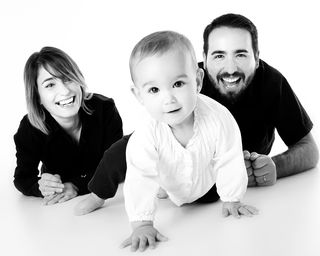Anxiety
How Parental Anxieties Shape Childrearing
New research reveals when parents worry there are two outcomes for children.
Posted June 9, 2019 Reviewed by Gary Drevitch
Most parents have some degree of anxiety when a baby is born. Homer B. Martin, MD, and I discovered that this nervousness shows up in two patterns because as parents you are apprehensive for different reasons with different children. Parents project differently onto each baby. Projection is believing your baby has the same thoughts, emotions, and standards as you do. This projecting in turn emotionally shapes or conditions each of your children. We call this practice emotional conditioning.

Distinct Patterns of Worry for Different Children
We do not raise all our children the same way. Our parental style of uneasiness varies from one child to the next. The result is the same parents condition children in the same family divergently. Further, we surprisingly found that parents are united as to what to worry about for each of their offspring. Later on, as he or she grows, each child displays specific behaviors, ways of thinking, and ways of experiencing their emotions, depending on the variety of parental conditioning we project onto them.
Seeing Fragile Babies
Some of us worry too much about the helplessness of our infant. Of course, at first all babies are dependent on us for everything. But for these parents’, anxieties lead them to hover over their babies and anticipate every need as if their babies were frail and require constant assistance.

Anxiety Over Independence
As our fragile baby grows, we fear his or her independence, accomplishments, and self-sufficiency. We may carry our infant everywhere, delaying crawling or walking. We fear our baby cannot do or be anything without us doing it for him. We may fear his falling and getting hurt or his failing at a task. We may hold him back a year before allowing him to start school and often baby him or her. We grow anguished if our child accomplishes tasks that show he or she is maturing and growing up. We want him to remain immature and needy. We may even sabotage any steps our child takes toward her or his independence from us.
Over time this type of parental misgiving conditions a child to be overly dependent on others and to fear self-sufficiency. Such children grow up expecting others to meet their needs. They may feel incapable of satisfying their own needs or of putting out effort on their or others’ behalf. They become apprehensive when called upon to do schoolwork, chores, or later hold a job. They can have anger problems, erupting when they want others to take care of their needs and desires.
Seeing Capable Babies
Other parents worry for an opposite reason: Their misgivings have to do with whether and how well their baby can perform and accomplish goals on his own. They may be anxious to wean early, witness the child sit, crawl, walk, learn to read, ride a bike and so on. They push the child to excel. They become full of unease when she or he does not or has a hard time meeting their high expectations to accomplish above the child’s actual age.
Anxiety Over Dependence
With this form of parental anxiety we emotionally condition children into overachievers who have a difficult time asking for help. Such children believe they must do everything on their own and do it correctly without errors, just as we shaped them to think and behave. Such emotional conditioning creates a child who is overly hard on herself and who expects little help from others. She or he may become anxious and depressed whenever she fails to meet lofty expectations—hers or ours.
Power of Parental Projections
The actual traits or competencies of our child do not matter in competing with our parental projections. I have seen children with deafness, blindness, or cerebral palsy conditioned not as fragile children, but as emotionally strong and capable youngsters. I’ve also observed very bright, proficient children fawned over and treated as if incompetent. What is most important is each parent’s projections of how they see their child, not how their child is in reality.
Also, we did not find parental projections to differ because of a family’s socioeconomic status or because of a baby’s temperament—being a fussy or an easy baby. In some families we discovered fussy babies left to cry that were not tended to. And parents who do to and for easy-to-calm babies when they do not need it can overstimulate them and cause irritable babies.


